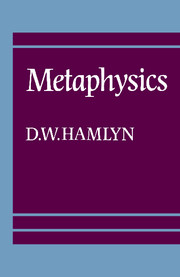5 - Particular and general
Published online by Cambridge University Press: 05 June 2012
Summary
The distinction
I indicated in Chapter 4 that particularity would generally be accepted as one characteristic of substances. I did not argue for that thesis, although I referred to arguments presented by Aristotle and Strawson for the conclusion that it is particular substances, or their Strawsonian equivalent, that primarily exist. Indeed Aristotle claims in the Categories (2b5) that unless particular substances existed it would be impossible for their corresponding species and genera and non-substance properties to exist. Strawson argues for a similar conclusion regarding material objects as basic particulars from the point of view of speaker–hearer identification.
It is arguable that later, in the Metaphysics, Aristotle came to a different conclusion because of further refinements in his view of what must hold good of a substance. He says that the primary cases of substance must be identical with their essences, and that amounts to their being self-explanatory, causa sui as Spinoza puts it. It is sometimes said of this later view that it amounts to the identification of substance with form, and because the word for form is the same as that for species it implies that Aristotle came to give greater priority to species than to particular instances of them. If such a view seems esoteric from the point of view of common sense, it should be noted that, if one attaches importance to what is permanent and persistent in the world, species have by that criterion a greater importance than particulars.
- Type
- Chapter
- Information
- Metaphysics , pp. 85 - 104Publisher: Cambridge University PressPrint publication year: 1984



